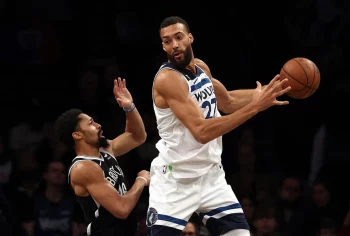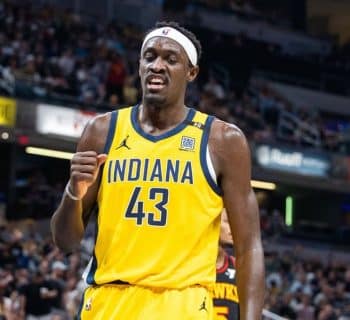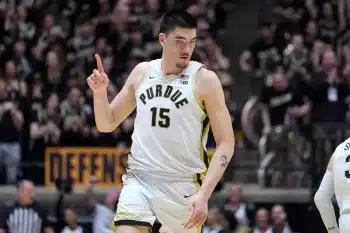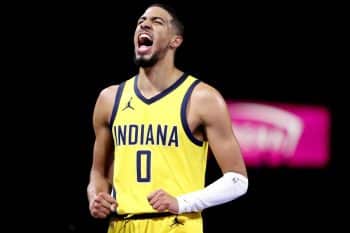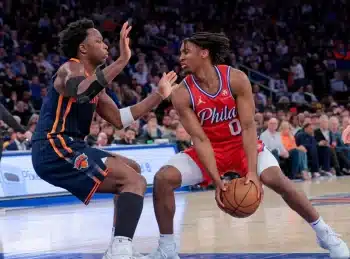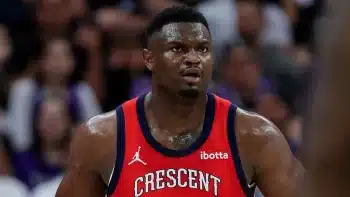NBA
Q&A: Larry Sanders Explains Break from NBA

Former NBA center Larry Sanders is one of the most misunderstood athletes in professional sports.
 When he decided to leave the NBA at 26 years old, agreeing to a buyout that left the bulk of his recently-signed $44 million contract with the Milwaukee Bucks on the table, most people couldn’t comprehend his decision. Yes, he took a personal leave of absence after being suspended twice for violating the NBA’s anti-drug program, but why would a very talented player walk away from the NBA and all of the perks that come with that lifestyle? Fans were equally confused and disappointed, as Sanders had become an exciting, up-and-coming center in Milwaukee.
When he decided to leave the NBA at 26 years old, agreeing to a buyout that left the bulk of his recently-signed $44 million contract with the Milwaukee Bucks on the table, most people couldn’t comprehend his decision. Yes, he took a personal leave of absence after being suspended twice for violating the NBA’s anti-drug program, but why would a very talented player walk away from the NBA and all of the perks that come with that lifestyle? Fans were equally confused and disappointed, as Sanders had become an exciting, up-and-coming center in Milwaukee.
Sanders had averaged 7.3 points, 6.1 rebounds, 1.4 blocks with a 7.1 block percentage over the course of his five-year career. His breakout campaign was the 2012-13 season, when he averaged 9.8 points, 9.5 rebounds and 2.8 blocks in 27.3 minutes while shooting 50.9 percent from field. That season, his averages per-100-possessios were 18.2 points, 17.6 rebounds and 5.3 blocks. At one point, he led the league in limiting opponents’ shooting percentage at the rim, so it was a no-brainer for Milwaukee to invest in him in August of 2013.
Then, he surprised everyone and decided he needed a break from the NBA lifestyle.
Well, Basketball Insiders recently caught up with the 27-year-old Sanders to discuss why he decided to leave the Bucks, why an NBA comeback isn’t out of the question, what off-court endeavors he’s been pursuing and much more in this wide-ranging, exclusive interview.
Basketball Insiders: Making the decision to walk away from the NBA couldn’t have been easy. You left a lot of money on the table and that was your career at that point. I know you’ve always had other interests, but how hard was that decision to make and how long did you grapple with it?
Larry Sanders: “Because I started playing basketball late, I had other interests before that. I love basketball and the competition and the comradery and all of that. But, at the same time, I feel like basketball took a lot away from me too. It limited me in a lot of ways. And I’ve been an artist my whole life. I loved drawing. I wanted to be an oceanographer. I’ve skateboarded for the majority of my life. I always had this artistic and rebellious way about me, and it clashed with the NBA culture. It really did. I got to the point where I realized that the NBA is a machine. It’s going to keep running, with or without you. If it can keep running without Allen Iverson – Allen Iverson! – then it’s definitely not worried about me. I knew that, and I also knew they really didn’t have the time to get to know me, to understand me and who I am. And look, I totally understand that. I get that. But I just felt like I had to put myself in a better position in life, to feel more fulfilled. At the end of the day, I’m left with myself, my loved ones and the life I made. I wanted to be someone who was proud of their story. It was always about staying true to myself. I didn’t want to lose myself and who I was for anything. No amount of money. Nothing.”
Basketball Insiders: How much do you miss basketball? You mentioned that you love the game and once you’re in that culture, it’s hard to just completely remove yourself from it. Do you watch games and still play at all?
Larry Sanders: “Oh, I do miss it. I have season tickets for the Los Angeles Lakers and I love watching and dissecting the game. I mean, I love this game. I really do. I love to play it, and I do still play a lot here in L.A. But there were some things about it, some situations, that I didn’t love. But I feel like I’m in a much better place right now and I’m equipped to be able to put myself in that situation again.”
Basketball Insiders: That’s great to hear, because your well-being was my biggest concern. When you walked away, you made comments about working on yourself as a person and needing time to sort things out since you were dealing with anxiety and depression. How are you doing?
Larry Sanders: “It’s been going great, man. I think that’s just the process of life. I had to take that time for my development, to develop into the type of man that I need to be. That time [to work on yourself] isn’t really given to us, but there’s a lot of value in making some time for yourself and I hope other people can find the time to do that too. Some people never do that or can’t do that, and that just saddens me. Stepping out of the NBA schedule and doing that was good for me, I’m very happy now.
“And I’m happy for everyone still in the NBA having success. I see what’s about to happen with the salary cap rising, and I’m so happy because those guys deserve it. For what they do out there, risking their bodies, they deserve it. I risked my body; I got my orbital [bones] blown out and temporarily lost my eyesight. Because those guys are taking a risk every time they step on the court, I’m glad they’re going to get some more money for what they’re doing.”
Basketball Insiders: You mentioned you’re in a better place, which leads to the big question that everyone is asking. Do you see yourself making an NBA comeback anytime soon?
Larry Sanders: “I could see myself coming back to the NBA and… I mean, I’ll just leave it at that. I can’t say too much. (laughs) I can see myself coming back there.”
Basketball Insiders: Your name gets mentioned in rumors whenever a team needs a big man or is looking to make a free agency signing. Have teams been calling you or your camp to express interest?
Larry Sanders: “I’ll say this: I understand who I am as a player and I know what I can bring to any team. Now that I’ve gotten the chance to watch a lot of basketball, I just know what I would do on that court. Even from an effort standpoint, I know I can [play harder than a lot of players]. With the kind of player that I am, I just don’t see a team that couldn’t use my services. But I will say, I think it would have to be a very good fit for the both of us. And I think it goes outside of what’s happening on the court – there has to be a connection there. Maybe I’m asking for too much. (laughs) But I just won’t go back to the situation I was in before.” Editors Note: Larry agreed to play with VCU’s alumni team in The Basketball Tournament, which has a $2 million prize and will be broadcast on ESPN.
Basketball Insiders: In the meantime, you’ve started an art management company where you work with a variety of artists and put out some of your own work (including a rap track called Black Mercedes). What made you decide to start that and how is it going?
Larry Sanders: “It’s been going well. It started because when I was an artist, I didn’t have much creative freedom or creative nourishment. I felt kind of trapped and I wanted to create a place where I could give other artists the resources they need and where they don’t have to feel trapped. I didn’t want them to feel limited by anything. And there are artists who don’t even own their art, and I felt like that was a huge problem. I wanted our artists to own their art, be able to display it freely and choose exactly what they wanted to do with their work. It was a shift [away from basketball], but it was just a calling for me, honestly. It’s been going great. I’ve been working with some artists for the last eight months, developing them, shooting videos for them and providing space for them. This is my first time doing this, so it’s been a great learning experience. I have the right intentions, and now I’m learning about the structure and all of that. Now, we’re at the point with the company where we have a photographer, business partners, artists and me. We’ve had artists come through our system and end up in a better situation, which is great. That’s what we want. That’s all I want for them. A lot of these people are starving artists – some are living out of their cars – and we’re not asking anything from them. We just want to use our resources to help them and I want to put my name by them to co-sign them. It’s just awesome and it’s a great, great feeling to see these guys flourish. It’s like I’m freeing myself doing this.”
Basketball Insiders: Speaking of freedom, I’ve always said that the life of an NBA player is more difficult than outsiders see. There are a lot of sacrifices – from the rigorous schedule, to the loneliness since you’re away from your loved ones, to all of the rules, to the physical and mental exhaustion. Yes, NBA players make a ton of money, but there are a lot of difficult things to deal with too. Do you think there are misconceptions about the NBA lifestyle and that people don’t fully understand what it’s like?
Larry Sanders: “Yeah, but as long as those people are seeing it from the outside looking in, there will always be misconceptions. It’s like filtering something through a net, you’re never going to get the real thing, the raw thing. It’s hard to understand unless you’re there actually experiencing it. But life is life. A great friend of mine told me a great phrase: ‘The top isn’t that bright and the bottom isn’t that dark.’ I do think that people are starting to understand that NBA players are people too. They can step back and say, ‘Oh, that’s just a normal guy.’ People forget that because of certain depictions. And a lot of them are choices that we didn’t get to make. I don’t think humans get to make many choices in society. I was born only 27 years ago so I’m still developing and trying to grow, but it seems like people don’t have too many choices when it comes to the world around them. I think I directly experienced that. I was everything that everyone thought I was, but I was also none of it at the same time. Everyone tries to put you in categories and label you and, honestly, dumb you down.
“I stepped into the basketball culture later than most people. I started playing organized basketball when I was 15 or 16 years old. That’s when I really started to experience the whole culture of basketball, and I fell in love with it. I loved playing the game and having a team, but it was also such a shock. AAU was a huge shock. I only played one year of AAU, but it was a huge shock seeing the manipulation and what players had become accustomed to because those things had just become the norm. They allowed these crazy things into their lives, but me, who was almost stepping into adulthood, was like, ‘No, this doesn’t feel good.’ That was a challenge.
“Then everything happened so fast. I had no aspirations of playing in college, but in that one year in AAU I broke out, so suddenly a bunch of mid-major schools are looking at me. I chose VCU because it was an arts school – they were like 16th in the nation at the time when it came to their arts program and engineering and what not. Then, from there, I started to make leaps and bounds because I had a great coach in Anthony Grant, who was excellent for my development. Then things kept moving fast. I was seventh or eighth in the nation in blocks in my freshman year. Then, in my sophomore year, I had Eric Maynor with me and he’s one of the best teammates that I ever had. I always viewed him as a teammate and basically a coach too. I think anyone who has ever played with him can say that about Eric. He was there in Oklahoma City in the beginning when it was Kevin Durant, Russell Westbrook, James Harden and if you talk to those guys right now, they’ll tell you how significant he was to that team. Man, I love Eric. He kept us in the gym, he kept us working hard and he’s just a different kind of person. So he pushed me and made me better. Then I was drafted by Milwaukee and had Scott Skiles in my life, and everyone knows he’s a hard-nosed coach, but he got me so disciplined on defense. He turned me into a defensive animal! And it was because he didn’t let me make mistakes, because I got screamed at for every mistake I made! (laughs) I may not have responded well to all of the personal stuff, but if you had a system and a certain way of doing things, I was all about it. ‘Let’s do it!’ And if I’m doing something wrong, I want to know! He would let me know, so I was blessed to have him. Then I had Larry Drew, and then I had Jason Kidd.
“I always had great people around me throughout my basketball career. I was truly blessed because they were all so significant and each one helped me take the next step up and get better. Every year, there was a such a significant person that would become part of my life and help me so much. I still talk to Anthony Grant, who is now in Oklahoma City as an assistant. I still talk to Shaka Smart. These are my friends and have helped me in life just as much as basketball. It’s just awesome to have those people around me and I’m very thankful for that.”
To reach out to Larry, send him a message on Twitter (@LarrySanders).
